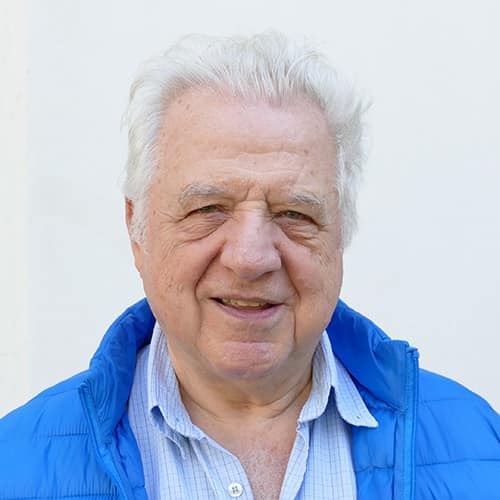Dear Constantino,
Today, I will speak about a somewhat unusual topic among scientists, and that topic would be magic. However, it befits the occasion since I believe that the man we celebrate today deserves the honorary title magus for a life’s work that falls nothing short of what one might call an opus magnum.
But what constitutes a work of epic dimensions, an opus magnum, and what is it that is magic about it? For that, we, first of all, have to recognize that magic at all times has been the “art of making things happen.”
Traditionally, the magic woven with words and symbols has often been considered the loftiest type one can perform. Some words spoken or some symbols written, and the world changes for good. To achieve this means opus magnum for the mage. And I will have no hard time convincing you that who I am talking about here has without question performed such a feat.
OTHER WISE MEN
In fact, the history of science knows many persons we could identify as magi by their magna opera. Most prominently, we, for instance, had Kepler and Galileo, who, with some tools fashioned, some words spoken, and some symbols written, changed a world that before held the earth at the center of the Universe (at least in medieval Europe) to one where we inhabit the third planet orbiting our sun. Like them, Einstein and Lorentz (and consorts), with some words spoken and some symbols written, obliterated a Universe to build a new one. Followed by the other, maybe even more mysterious magic of the quantum that, with some symbols written and some words spoken, obliterated another center. The center of certainty itself.
Where the first ones, together with Newton, obliterated the center of the Universe — so that henceforth anywhere and nowhere would we find this center, for each grain of dust to claim to be its own center — the latter performed a secrete marriage between light, space, matter and time itself. The grain of dust now is not only its own center but also its own path, and, with it, its passage of time and space becomes its very own. The price we paid for this magic of gaining certainty — that light moves at the same speed for anyone and anything—is that anything that travels slower than light can never quite reach light speed.
It’s a very egalitarian thing, one might say. However, while the first two magic acts made us more egalitarian and individual, the third one, that of the quantum, not only has given us unprecedented technological progress, it also has entangled us in Janus-faced interaction as both observers and observed in ways that yet remain to be fully understood (as Garry Larson might put it). Ripples on a pond. Thoughts and symbols that transcend time and space. A ripple of which Euclid was as much part as Kopernikus, Newton, and Einstein were. An opus magnum is not a singular act. It participates in deeper and darker currents of our collective thought excitations, and yet it is a focal point at which ripple scatters, gets amplified, modulated, and changes direction.
BEYOND PHYSICS
Of course, not only physics knew its magi. There are the likes of Darwin who, similarly, obliterated a world of constancy. He obliterated a world in which everything was made the way it happened to be since the beginning of time — even our Universe was still static, neither expanding nor contracting. Now, with some symbols written and some words spoken, species that always have been the way they were, unchanging, were propelled into a world where our, or anybody’s, lineage traces back to the proverbial primordial soup for which earth, our milk-mother, turned out to be the right cauldron to cook up life.
Now, many opus magnum is more subtle. They start tiny, maybe as a seemingly harmless question, such as: If observations of a phenomenon are distributed following power laws and not exponential laws, then could it be that the process underlying the phenomenon is subject to a notion of entropy that differs from what we have learned that entropy is? What do we maximize in order to predict the typical, most likely distribution of observed events? Some words spoken and some symbols written, and another ripple — a ripple of statistical thinking — that excited the brains of other magi, such as Bayes, Boltzmann, Gibbs, von Neumann, or Shannon, found itself another focal point in the person we celebrate here today.
And again, it is a world of constancy and equilibrium that some words spoken and some symbols written are obliterated. The gravitational body of our Universe is fundamentally out — of equilibrium. If it were not like that, no eyes would ever have evolved to see it and no ears to hear it. We are children of gravity. Darwin realized it in the evolution of species, Einstein in the geometry of space-time, and now — through the new focal point — it has been realized in the statistical description of complex processes and systems that entropy is key to.
A LIFE OF ITS OWN
It is one of the characteristics of an opus magnum that it takes on a life of its own and, in the end, outgrows the spell-caster, who in the process becomes the director of the ripple rather than its origin. Origins of events always lose themselves in the historical process that led up to them, making us conduits that transform ripples that already were there. Another characteristic of an opus magnum is its irreversibility. It is a Jinni that will not go back into its bottle to promiscuously go out into the world and excite other brains to spawn offspring and evolve into ecosystems of ideas and concepts that typically are much richer than originally anticipated.
Nonetheless, as biological life forms inherit genes from their ancestors, also ideas, as they ripple away on a pond of brains, they also always inherit some of their directors agens, which identifies as the body of event trails that originate from a person and persist while mingling with the world. The main characteristics of an opus magnum, however, rest in its subversiveness that identifies a prison we unwittingly keep ourselves in and in its power to corrode the chains that shackle us. The question it begins with becomes a cry for freedom, the freedom to see the world anew from a heretical perspective.
THANK YOU
Dear Constantino, it is this I want to thank you for from the bottom of my heart; you asked the pivotal question that challenged the ways we looked upon entropy. You became the heretic who recognized a prison of mind, and Tsallis entropy became the acid that corroded the shackles of equilibrium thinking and the subversion that directed the ripples that took us all along a ride that I incredibly enjoyed and keep enjoying. You have set the Jinni of entropy free, and Tsallis entropy went out into the world and promiscuously spawned offspring that all probe the ecosystem of possibilities to understand what we can mean when we say entropy. The spell you cast, i.e., the story you initiated, has already taken on a life of its own and has already outgrown not only you but all of us who were lucky enough to participate in this journey. Wouldn’t you agree that, therefore, your work shows all hallmarks of an opus magnum and accept that, in the best of senses, you are a mage?
Constantino, you have touched the lives of countless people, not only with your work but with your big heart and your generosity that we were allowed to enjoy, for instance, when we visited you in Rio. Therefore, I want to end my musings with a recollection of what Murray Gell-Mann once, in one of our conversations at the Santa Fe Institute, had to say about his own fascination with entropy in particular and complexity science in general. Murray said that the time reminded him of the early days of Quantum Mechanics when things were not yet fully settled (meaning, as settled as a scientific theory can ever be), and one could enjoy the freedom of thought that one can only experience when a revolutionary process is still in its infancy, and everything is still filled with youthly potential. That we were allowed to participate in such times is the greatest gift of all.
Dear Constantino,
Thank you, and all the best heartfelt wishes for your 80th birthday.
Rudi
Constantino Tsallis is a pioneer in the applications of statistical physics to complex systems. He is best known for introducing Tsallis entropy and Tsallis statistics, and for shaping views on power laws in complex systems. Tsallis is an external faculty member at CSH and emeritus professor at the Centro Brasileiro de Pesquisas Físicas in Rio de Janeiro, Brazil.
A number of events are being held to commemorate Tsallis’ 80th birthday. The conference “Statistical Mechanics for Complexity” takes place between November 6 and 10 in Rio. The journal Entropy has a special issue dedicated to Tsallis: “Nonadditive Entropies and Nonextensive Statistical Mechanics”.


